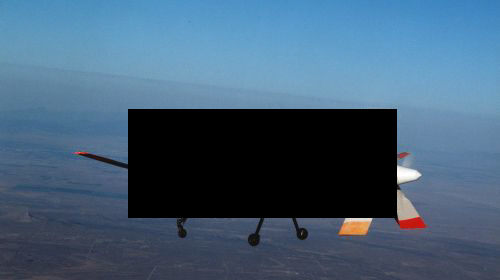
Wired last week that the Apple App Store has rejected an app that compiles news reports in order to map overseas U.S. drone strikes, and provide users a pop-up notification whenever a drone strike has been reported.
Apple rejected the app several times, at first citing problems with its functionality, and then telling the developer that the app ÔÇ£contains content that many audiences would find objectionable.ÔÇØ
U.S. drone strikes have become a highly controversial issue, with critics saying that the strikes are and (and the └¤░─├┼┐¬¢▒¢ß╣¹ taking issue with the legality of some of the strikes). The issue has emerged as one of the hottest foreign policy issues of our time.
An app providing a stream of basic information about the conduct of a policy that is the subject of current public debate would seem as American as, uh, apple pie.
Of course, Apple is a private company not covered by the First Amendment, and the App Store is not a public forum. In fact, Apple is arguably like the New York Times, with a right to pick and choose what it ÔÇ£publishes.ÔÇØ
But aside from what Apple has the right to do, you have to wonder how many of its customers say to themselves, ÔÇ£wow, I got a new iPhone, oh boy, now I can access all the information in the world that Apple allows to filter into my new device because nobody finds it objectionable!ÔÇØ Most people would be surprised to find, upon buying a desktop computer, that HP, Dell, or Lenovo was going to tell them what programs and content they could and could not install. We must hope that the computers we carry in our pockets (our smartphones) will eventually be as free. By providing a leading smartphone operating system, Apple is now a major player in the telecommunications space, and while not a monopoly, is certainly participating in a highly networked, oligopolistic market.
Regardless of the legalities of AppleÔÇÖs ÔÇ£private censorship,ÔÇØ ultimately we need information to flow freely through the major nodes of our information infrastructure. If major players decide to censor information because one party or another takes offense, free speech and democracy will be the worse for it.
Companies have a choice: they can embrace the raucous, often messy path of freedom and openness, or they can try to take the path of picking and choosing who can communicate with whom, and how.
One problem with picking and choosingÔÇöprivate censorshipÔÇöis that it can be plenty messy in its own way. Apple has found itself in a nonstop string of controversies over its editorial decisions for the App Store. When youÔÇÖre the gatekeeper, of course, you get criticized not only for what you block, but what you allow. In recent years the company has:
ÔÇó Blocked apps from cartoonist Mark Fiore because, according to Apple, he ÔÇ£.ÔÇØ
ÔÇó Warned a developer that it would block anything
ÔÇó Became embroiled in a controversy over an anti-gay ÔÇ£Manhattan DeclarationÔÇØ manifesto when it approved and then an app that allowed users to vote for the declaration.
ÔÇó Rejected a app unless profane words were removed.
ÔÇó Pulled a from its store following a "wave of complaints."
ÔÇó that notified users of the location of police sobriety checkpointsÔÇöessentially, allowing citizens to share and distribute information about police activity. That move followed the writing of a letter by several Senators into doing so. (Blackberry also agreed to censor the app, while Google did not.)
This kind of capricious suppression is reminiscent of the behavior of an authoritarian regime, leaving app developers at their mercy, forced to guess what will and will not pass muster, and often looking just plain silly in their old-fashioned .
True, as Wired points out, the Apple reviewers face a very difficult taskÔÇöaccording to this , sorting through a ÔÇ£slush pileÔÇØ of thousands of submitted apps, much of it ÔÇ£garbage.ÔÇØ Protecting their customers from the dreary task of having to wade through such garbage is probably the idea. But that kind of sorting task is something that the marketplace and/or the crowdsourced hive mind (not the same thing) is pretty good at.
And some of AppleÔÇÖs silly decisions might just be quirky actions by individual employees.
But the problem with censorshipÔÇöpublic or privateÔÇöis that itÔÇÖs devilishly difficult to administer consistently. A company like Apple, once it decides to become a gatekeeper, should not be surprised to quickly find itself in a morassÔÇönot only the morass of ÔÇ£junkÔÇØ in its slush pile, but a political morass as it gets drawn into various passionate debates, and a public relations morass as its judgments are ridiculed.
This latest incident, the suppression of the drone-strike app, might be just another example of the capricious stupidity that censors the world over always seem to display at least partly because of the inherent difficulties of their ÔÇ£art.ÔÇØ But in this case the repeated rejections, their shifting rationales, and the alignment of this action with the interests of our government, cannot help but create suspicion of darker possibilitiesÔÇöthat the company in some way has agreed to start protecting the interests of our national security establishment (if not necessarily our national security). Similar questions were raised when the company allowed and then three days later a Wikileaks App from the store, at a time when the U.S. government was pressuring numerous companies to the reporting organization (a blockade that companies are striving to ).
That brings up a final disadvantage of censorship: it always ends up being misused. By blocking the drone-strike app, is Apple helping their customersÔÇöor the national security agencies? TheyÔÇÖre certainly not helping their country.
Free speechÔÇöitÔÇÖs is not just in the Constitution, itÔÇÖs also a good idea!

